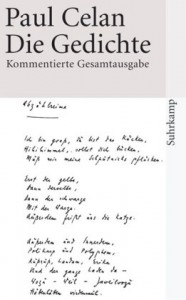Die Gedichte. Kommentierte Gesamtausgabe
 About one thousand pages of Celan’s poetry.
About one thousand pages of Celan’s poetry. I’m in for a treat… This's my first all-encompassing collected edition of Celan's poetry.
When reading Celan’s poetry I always compare him with Berthold Brecht, whose poetry of social and political comment was much more clear-cut.
Celan’s poetry is always open to the unexpected and the unpredictable. One cannot foresee where one of Celan’s poems is going.
In Celan’s poetry each tiniest detail is meaningful, ie, the “meaning” (if one is able to discern meaning in Celan’s poems) only gets revealed in the wholeness of the poem and not by “understanding” the parts per se.
Like Rilke, Celan invented a new (German) language for himself (for instance the word “Der Irrsee”/”The Wildsee”?). German lends itself to the formation of compound words in a way that Portuguese (and English) do not. German verbs can also be given new functions through their direct combinations with prepositions (like Rilke did, but now going further afield).
Let’s see if I can make head or tail of the poems of his late period, which is the most difficult to “interpret”.
Final thoughts after reading the all thing: I'm still dazed... Bereft of words. Later on I'll try to give an account of this otherworldly poetry...
“Ich bin du, wenn ich ich bin” (I am you when I am I”/”Sou tu quando sou eu”) from the poem Lob der Ferne (Praise of Distance) is one of my favourite one-liners.



